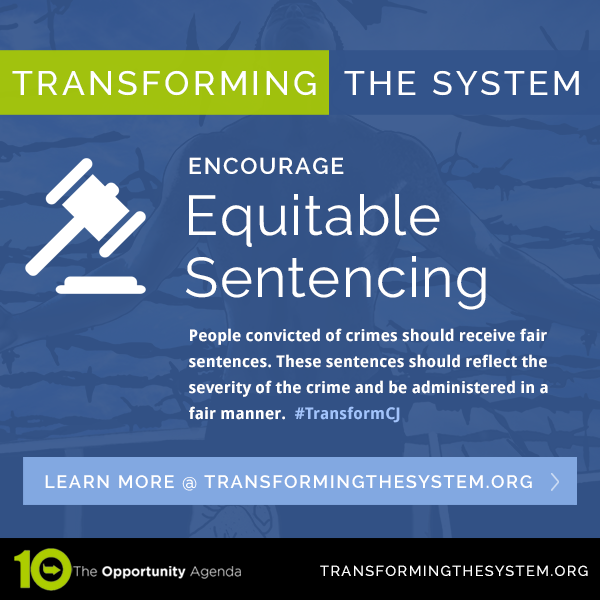Encourage Equitable Sentencing
We all want a criminal justice system that treats people fairly, takes a pragmatic and responsible approach, and ultimately, keeps us safe. When we’ve reached the point of deciding to deprive someone of their liberty, we have to be particularly fair and responsible and consider all options. Sentences should consider a range of factors and reflect the severity of the crime. We owe it to ourselves, our justice system, and to those being imprisoned to ensure that our sentencing practices are thoughtful and fair. Nonetheless, the explosion of the American prison population is largely due to sentences that are disproportionate to the severity of crimes. Prisons and jails are filled by many people who pose no threat to their communities. Laws that impose mandatory minimums contribute to mass imprisonment. Sentencing laws should be reformed to require transparency and mandate equitable practices that ensure that sentences are appropriate to the particular circumstances of an offense.
Solutions & Actions to Encourage Fair Sentences
1) Repeal “Truth-in-Sentencing” and “Three-Strikes” Law
Congress, and state and local legislatures, should repeal "truth-in-sentencing" laws, which limit access to parole and reductions in the amount of time that a person convicted of an offense serves, and eliminate habitual offender laws, including three-strikes laws that often result in overly harsh sentences.
2) Repeal Mandatory Minimums
Congress, and state and local legislatures should repeal mandatory minimum sentences and shorten sentence lengths across the board.
3) Use Alternatives to Incarceration
Legislatures should pass laws that encourage the use of alternatives to incarceration such as diversion programs, community service, and/or probation, where incarceration would otherwise be required. Incarceration should generally be avoided for less serious offenses and alternatives to incarceration should be incorporated into sentencing.
4) Prohibit Incarceration for Failure to Appear
Congress, and state and local legislatures, should prohibit the imposition of jail or prison time for alleged failure to appear, or failure to pay fines, to ensure that individuals are not being incarcerated for missing a court date.
5) Revise Sentencing Guidelines
The United States Sentencing Commission should revise the Sentencing Guidelines to incorporate additional alternatives to incarceration and lower sentences. The Guidelines should require that judges review bench cards with appropriate alternatives to incarceration.
6) Commit to Cutting Incarceration in Half
Congress, and state and local legislatures, should publicly adopt a stated goal of cutting incarceration in half by 2030 to encourage smarter sentences, a goal of JustLeadership USA.
7) Collect Data
State governments, judicial ethics organizations, Congress, and state and local legislatures should provide details on judicial sentencing determinations, disaggregated by race, religion, sex, gender, gender identity/expression, age, housing status, sexual orientation, HIV status, ethnicity, sexuality, immigration status, national origin, and religious affiliation.
8) Train Judges on Implicit Bias
State governments, judicial ethics organizations, Congress, and state and local legislatures should require regular and routine training programs for judges on implicit bias and educate judges on their role in reducing mass incarceration. This training should include tools to reduce bias such as bench cards, which provide judges with short questions and guidelines to consider during judicial proceedings, particularly before sentencing individuals.
9) Appoint Judges from Diverse Backgrounds
The Administration should prioritize judicial appointments and focus on appointing judges who represent diverse sectors within the legal industry, particularly those with public defense and public interest backgrounds. Community members should support the election of judges who express a commitment to reversing mass incarceration and to adopting fair sentencing practices.
10) Evaluate Ability to Pay
Federal and state judges should refrain from placing individuals in contempt of court for civil fees or fines. In the event that courts do elect to place individuals in contempt for this conduct, it should only be done after the court has determined that the individual has the actual financial means to pay the fees or fines.
Solutions in Action
We’ve identified programs and initiatives that incorporate some of these solutions. They may provide inspiration, albeit at times imperfect, for others who are interested in instituting some of these policies.
- The Minnesota Judicial Branch has issued implicit bias bench cards that judges can use to help mitigate against implicit bias during sentencing.
Flashcards
Below are flashcards for you to use the next time you have a media interview, need to write an opinion piece, or just need some ideas as you think through your messaging strategy.
Encouraging Alternatives to Prison and Jail
value
We all want a criminal justice system that treats people fairly, takes a pragmatic and responsible approach, and ultimately, keeps us safe. When we’ve reached the point of deciding to deprive someone of their liberty, we have to be particularly fair and responsible and consider all options. Sentences should consider a range of factors and reflect the severity of the crime. We owe it to ourselves, our justice system, and to those being imprisoned to ensure that our sentencing practices are thoughtful and fair.
problem
Nonetheless, the explosion of the American prison population is largely due to sentences that are disproportionate to the severity of crimes. Prisons and jails are filled by many people who pose no threat to their communities. Laws that impose mandatory minimums contribute to mass imprisonment. It defies logic to continue to imprison so many people who could experience rehabilitation much more effectively (and through much cheaper means) while still able to contribute to society, support their families, and remain a part of their communities.
solution
We have to replace our “one size fits all” attitude to sentencing with a responsible approach that recognizes the merit of a range of rehabilitative programs that still ensure justice is served, but more fairly and more sensibly.
action
Tell the United States Sentencing Commission to revise the Sentencing Guidelines to allow for alternative to incarceration, especially for individuals who been convicted of less serious crimes. Urge Legislatures to replace incarceration with community service and/or probation for less serious offenses.
For more information on sentencing reform, check out:
- The Sentencing Project, which advocates for a “fair and effective U.S. criminal justice system by promoting reforms in sentencing policy, addressing unjust racial disparities and practices, and advocating for alternatives to incarceration.”




